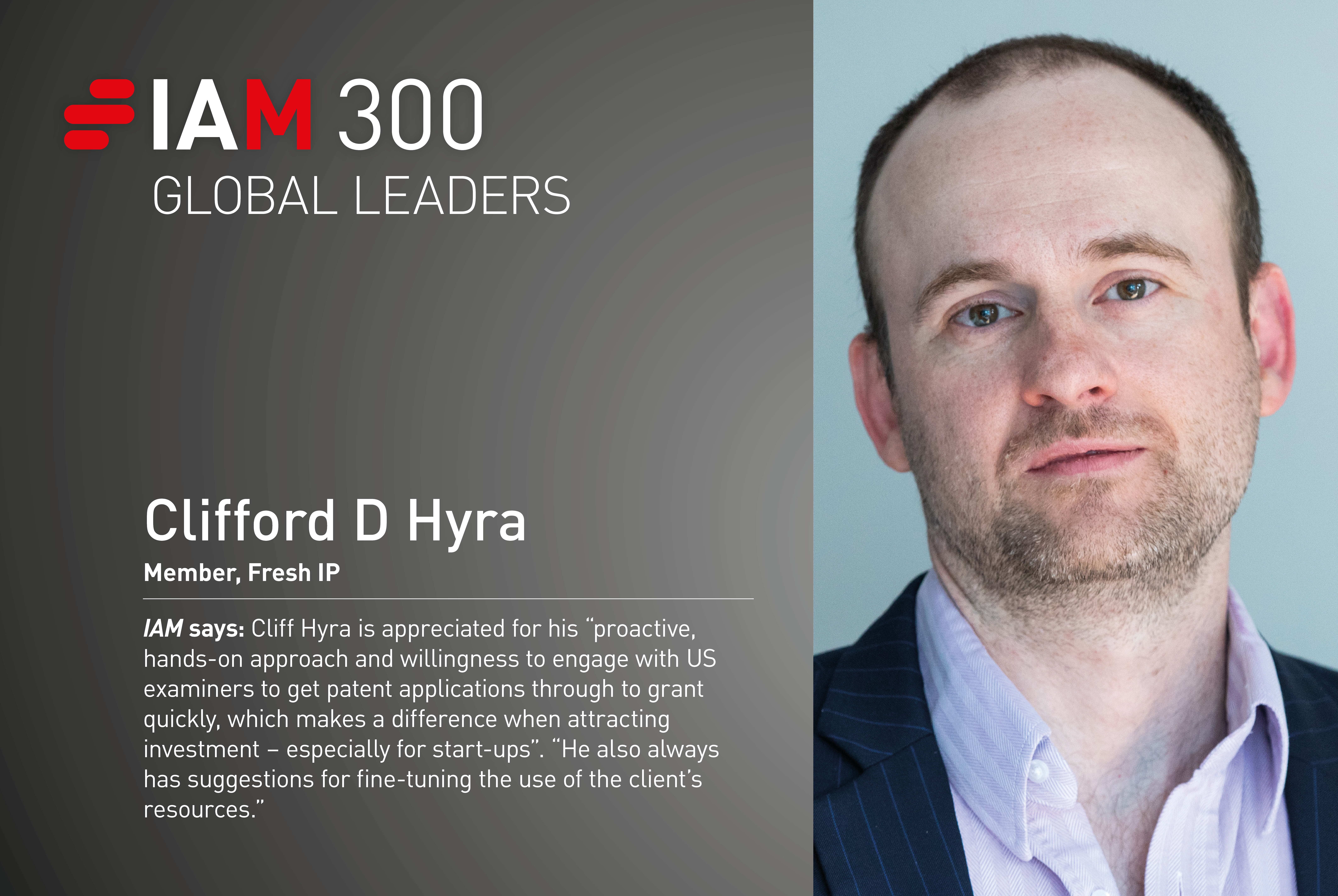Cliff Hyra
What inspired you to pursue a career in intellectual property, and what advice would you give to others considering the same?
If you want to make a difference and help shape the future, the technological frontier is a great place to be. I am awed by my clients’ achievements every day. I am so grateful to be in a position to help them as they (and we) journey into the future. I encourage anyone interested in an IP career to make a serious evaluation of their abilities and to seek out a role where they can make an impact.
If you could change three things about the US prosecution landscape, what would they be, and do you think they are likely to happen?
The United States desperately needs an overhaul of its patent subject-matter eligibility law. The USPTO and courts have done an amazing job working with what they were given by the Supreme Court to develop a coherent system for determining patent eligibility, but we are still left with a confusing patchwork of rules and decisions that too often have arbitrary and non-transparent outcomes. The USPTO does not trust examiners to make their own determinations and instead decisions are made by a subject-matter eligibility group that is completely inaccessible and accountable to no one. Updating the patent laws to provide clarity and remove ambiguity would be a tremendous benefit to the most innovative businesses working on cutting-edge AI and life science technologies.
The USPTO also needs to modernise its internal technology, policies and procedures. No one benefits from inscrutable decisions with regard to formalities made by nearly unreachable low-level employees, examiners incentivised to provide low-quality office actions or outdated systems that transform electronic forms into illegible scans. The USPTO should apply the feedback it has commendably been gathering in recent years and conduct an internal review and overhaul.
Finally, the Copyright Office needs to update its examination procedures for consistency with the law and modernise its electronic filing system. Its refusal to register meritorious works in contravention of US case law is confounding, and its appeal processes – while a dramatic improvement over previous years – remain antiquated.
None of these changes are on the horizon, but I am optimistic that our voices can help to bring these improvements to fruition and create an environment where innovation can thrive.
What are the key characteristics of a world-class patent prosecution strategy?
The foundation consists of systematically fostering a culture of innovation, identifying inventions that can and should be protected and selecting appropriate jurisdictions for conducting prosecution.
The choice of a starting jurisdiction and the process used to select final jurisdictions for protection have a critical impact on cost-effectiveness and final portfolio value. Businesses should use appropriate software and rational decision-making processes to make these determinations and improve their cost-benefit ratio. Selection of vendors and local firms should also be rationalised and systematised. Special expertise and cost-effectiveness should be emphasised in firm selection.
Sophisticated prosecution strategies should be utilised in all critical jurisdictions. In the United States, examiner interviews should be conducted as a matter of routine. Continuation practice is essential to portfolio development and value maximisation. Design patents should not be neglected and should be assigned to counsel with relevant expertise to ensure appropriate protection. Since these considerations differ in other jurisdictions, US counsel must especially educate foreign clients and counsel on these issues and their special importance in the US market.
What are the biggest challenges facing your clients at present, and how are you helping them to overcome these?
The biggest challenge facing most clients is fierce competition. Intellectual property is critical to giving them a competitive edge and protecting them from ruinous legal conflicts and unethical market practices.
You are active in the AI safety community. What are some of the biggest threats and opportunities that you see in this space?
The potential of AI – good and bad – is literally boundless. The main threat is that the rapidity of advances outpaces our ability to understand and control the newest developments. Other threats include potential popular backlash to AI and inefficient government policies and regulations.
Opportunities include rewriting the competitive landscape and achieving extraordinary productivity gains that make a new level of human prosperity possible. At Fresh, we are privileged to be working with AI companies that are pushing the envelope of the technological frontier. We seek out AI businesses with an aim towards helping them reach a scale where they can realise transformative technology at a societal level.
Cliff Hyra
Member
[email protected]
Cliff Hyra is a founding member of Fresh IP, a boutique IP law firm with a global focus on cutting-edge technology. He has extensive experience with global IP portfolio management and IP preparation and prosecution, opinions, due diligence, enforcement, contested proceedings, negotiations and agreements. His technical expertise includes engineering, computer-related inventions, medical devices and material science, as well as industrial designs.
